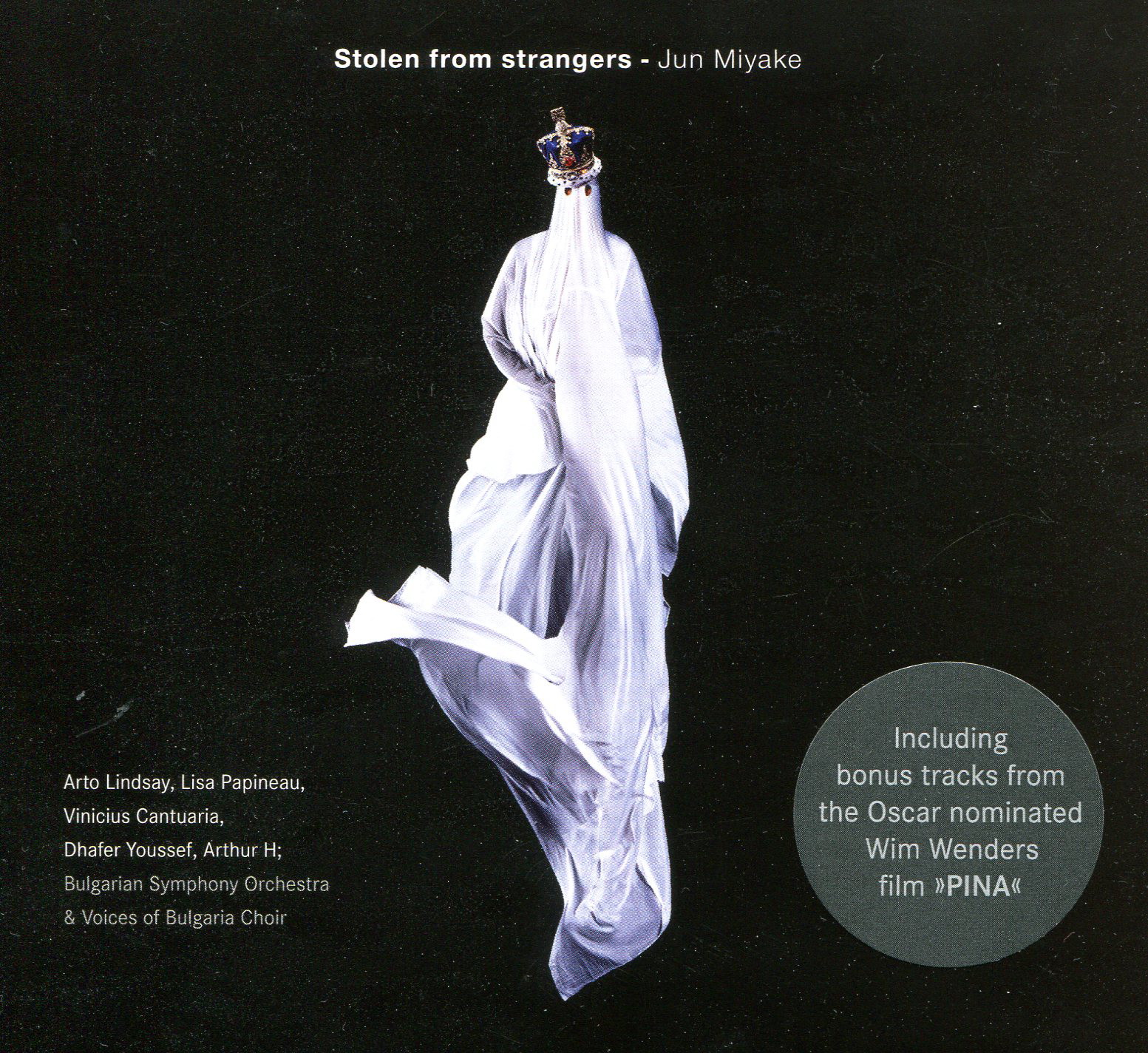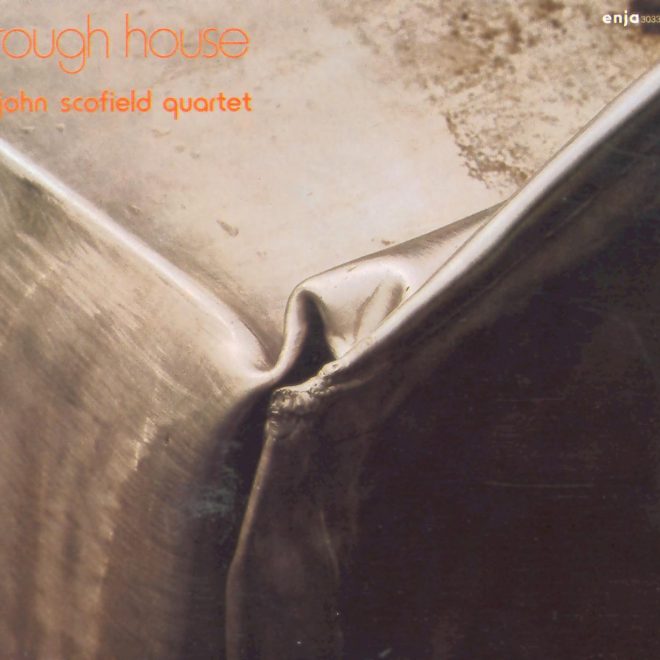Beschreibung
This man is afraid of nothing! Avantgarde, jazz, gregorian chant, trip hop, chanson, tango, pop hit, an Arab, Indien, Latin American and Asian musical vocabulary. Jun Miyake mixes all of this so tastefully that it is overwhelming. Executed by tuba, cello, oud, mandolin, a Bulgarian choir and a multitude of electronic and acoustic percussion from which Miyake extracts the most curious of sounds, there is only one conclusion to come to : for whoever likes the melting of contrasts, who likes Tom Waits, David Sylvian or Chet Baker, should absolutely listen to „Stolen from Strangers“. Only for those who like musical drawers, there is a need for caution: be careful, this recording endangers your musical perception of the world.
The protagonist Jun Miyake and his accolyte Arto Lindsay take a good portion of creative freedom. They unite what does not seem possible to unite, they mix oil and water as if there had never been any problem doing so. Daring without ever running the danger of shaking or stumbling, the duo moves forward on its way. Despite of all the stylistic changes, the red thread, which leads through this album like a thick rope, is always within reach. Taking into consideration all the peculiarities and exceptions, „Stolen from Strangers“ carries a clear handwriting.
And it is for this clear leadership that the Japanese trumpet player/pianist/producer has been admired for a long time now. Within the planned chaos, he never poses his scepter. This is due to his unique, unmistakeable handwriting in the invention of scurrilous arrangements – a crucial feature of his music. Hal Willner, star record producer (Lou Reed, Bill Frisell, Wynton and Brandford Marsalis, John Zorn, Sting, Ringo Starr, Keith Richards, Leonard Cohen, Elvis Costello, Nick Cave, PJ Harvey and many more) summarizes it: „His compositions are refined, complicated, but never overblown and always beautiful, with an excellent sense of humour“.
This judgement can also be applied to „Stolen From Strangers“. Already the opening title „Alviverde“ demonstrates Miyake’s playful love for experiment and characteristic individuality, qualities we know from personalities like Tom Waits or, well, Arto Lindsay. Added to that is a love of sound, which perpetrates the production to the tiniest of sounds. The Bulgarian Symphony Orchestra, which contributes the string arrangement parts, has such a delicate tremolo pianissimo, that any lover of sound will have tears in his eyes. How does Miyake manage to create such magical string sound?
In „The Here and After“ , the MPB star Vinicius Cantuaria, a companion of Miyake of many years can be heard on percussion. „Turn Back“ awakes association with the unforgettable Chet Baker, whose love of bossa tunes is common knowledge. His fragile singing and his interpretations of Antonio Carlos Jobim’s bossa evergreens have left a strong trace in the memory of jazz. „Turn back“ looks for the direct way into those neuronal depths, a tune in which Arto Lindsay is completely at easy as a singer and a „noise guitarist“.
The French language „Le Voyageur Solitaire“ reminds us of the big chansonniers: Serge Gainsbourg, Jacques Brel and others send a friendly wave. Not surprising, since no lesser artist than Arthur H. who has been a major star in France for a while, adds his immense voice. We already know the principle. The musette mentality of the verses is set against a refrain lead by tuba and a Bulgarian choir. The Cosmic Voices of Bulgaria do a perfect job. Fantastic! In the next track „Easturn“ these heavenly voices take on the leading part. While the Bulgarian Symphony Orchestra is allowed to enter into action in one of the few moments when their recording has not been electronically treated, Jun Miyake combines their acoustic charms with exquisite electro jazz experiments. He is given support for this by Dhafer Youssef, whose oud and chant cannot be ignored ever since the release of his „Electric Sufi“ CD in 2001.
A chanson-like Polka with mandolin, trombones and rough gypsy strings invites the surprise on „Le Mec dans un Train“. Slowly, you run out of words to describe this wealth of invention and combinations. By the way: the artwork for „Stolen from Strangers“ is by Jean-Paul Goude, the French star photographer, who has, amongst others, created striking images for Björk and Grace Jones.
This man is afraid of nothing! Avantgarde, jazz, gregorian chant, trip hop, chanson, tango, pop hit, an Arab, Indien, Latin American and Asian musical vocabulary. Jun Miyake mixes all of this so tastefully that it is overwhelming. Executed by tuba, cello, oud, mandolin, a Bulgarian choir and a multitude of electronic and acoustic percussion from which Miyake extracts the most curious of sounds, there is only one conclusion to come to : for whoever likes the melting of contrasts, who likes Tom Waits, David Sylvian or Chet Baker, should absolutely listen to „Stolen from Strangers“. Only for those who like musical drawers, there is a need for caution: be careful, this recording endangers your musical perception of the world.
The protagonist Jun Miyake and his accolyte Arto Lindsay take a good portion of creative freedom. They unite what does not seem possible to unite, they mix oil and water as if there had never been any problem doing so. Daring without ever running the danger of shaking or stumbling, the duo moves forward on its way. Despite of all the stylistic changes, the red thread, which leads through this album like a thick rope, is always within reach. Taking into consideration all the peculiarities and exceptions, „Stolen from Strangers“ carries a clear handwriting.
And it is for this clear leadership that the Japanese trumpet player/pianist/producer has been admired for a long time now. Within the planned chaos, he never poses his scepter. This is due to his unique, unmistakeable handwriting in the invention of scurrilous arrangements – a crucial feature of his music. Hal Willner, star record producer (Lou Reed, Bill Frisell, Wynton and Brandford Marsalis, John Zorn, Sting, Ringo Starr, Keith Richards, Leonard Cohen, Elvis Costello, Nick Cave, PJ Harvey and many more) summarizes it: „His compositions are refined, complicated, but never overblown and always beautiful, with an excellent sense of humour“.
This judgement can also be applied to „Stolen From Strangers“. Already the opening title „Alviverde“ demonstrates Miyake’s playful love for experiment and characteristic individuality, qualities we know from personalities like Tom Waits or, well, Arto Lindsay. Added to that is a love of sound, which perpetrates the production to the tiniest of sounds. The Bulgarian Symphony Orchestra, which contributes the string arrangement parts, has such a delicate tremolo pianissimo, that any lover of sound will have tears in his eyes. How does Miyake manage to create such magical string sound?
In „The Here and After“ , the MPB star Vinicius Cantuaria, a companion of Miyake of many years can be heard on percussion. „Turn Back“ awakes association with the unforgettable Chet Baker, whose love of bossa tunes is common knowledge. His fragile singing and his interpretations of Antonio Carlos Jobim’s bossa evergreens have left a strong trace in the memory of jazz. „Turn back“ looks for the direct way into those neuronal depths, a tune in which Arto Lindsay is completely at easy as a singer and a „noise guitarist“.
The French language „Le Voyageur Solitaire“ reminds us of the big chansonniers: Serge Gainsbourg, Jacques Brel and others send a friendly wave. Not surprising, since no lesser artist than Arthur H. who has been a major star in France for a while, adds his immense voice. We already know the principle. The musette mentality of the verses is set against a refrain lead by tuba and a Bulgarian choir. The Cosmic Voices of Bulgaria do a perfect job. Fantastic! In the next track „Easturn“ these heavenly voices take on the leading part. While the Bulgarian Symphony Orchestra is allowed to enter into action in one of the few moments when their recording has not been electronically treated, Jun Miyake combines their acoustic charms with exquisite electro jazz experiments. He is given support for this by Dhafer Youssef, whose oud and chant cannot be ignored ever since the release of his „Electric Sufi“ CD in 2001.
A chanson-like Polka with mandolin, trombones and rough gypsy strings invites the surprise on „Le Mec dans un Train“. Slowly, you run out of words to describe this wealth of invention and combinations. By the way: the artwork for „Stolen from Strangers“ is by Jean-Paul Goude, the French star photographer, who has, amongst others, created striking images for Björk and Grace Jones.
This man is afraid of nothing! Avantgarde, jazz, gregorian chant, trip hop, chanson, tango, pop hit, an Arab, Indien, Latin American and Asian musical vocabulary. Jun Miyake mixes all of this so tastefully that it is overwhelming. Executed by tuba, cello, oud, mandolin, a Bulgarian choir and a multitude of electronic and acoustic percussion from which Miyake extracts the most curious of sounds, there is only one conclusion to come to : for whoever likes the melting of contrasts, who likes Tom Waits, David Sylvian or Chet Baker, should absolutely listen to „Stolen from Strangers“. Only for those who like musical drawers, there is a need for caution: be careful, this recording endangers your musical perception of the world.
The protagonist Jun Miyake and his accolyte Arto Lindsay take a good portion of creative freedom. They unite what does not seem possible to unite, they mix oil and water as if there had never been any problem doing so. Daring without ever running the danger of shaking or stumbling, the duo moves forward on its way. Despite of all the stylistic changes, the red thread, which leads through this album like a thick rope, is always within reach. Taking into consideration all the peculiarities and exceptions, „Stolen from Strangers“ carries a clear handwriting.
And it is for this clear leadership that the Japanese trumpet player/pianist/producer has been admired for a long time now. Within the planned chaos, he never poses his scepter. This is due to his unique, unmistakeable handwriting in the invention of scurrilous arrangements – a crucial feature of his music. Hal Willner, star record producer (Lou Reed, Bill Frisell, Wynton and Brandford Marsalis, John Zorn, Sting, Ringo Starr, Keith Richards, Leonard Cohen, Elvis Costello, Nick Cave, PJ Harvey and many more) summarizes it: „His compositions are refined, complicated, but never overblown and always beautiful, with an excellent sense of humour“.
This judgement can also be applied to „Stolen From Strangers“. Already the opening title „Alviverde“ demonstrates Miyake’s playful love for experiment and characteristic individuality, qualities we know from personalities like Tom Waits or, well, Arto Lindsay. Added to that is a love of sound, which perpetrates the production to the tiniest of sounds. The Bulgarian Symphony Orchestra, which contributes the string arrangement parts, has such a delicate tremolo pianissimo, that any lover of sound will have tears in his eyes. How does Miyake manage to create such magical string sound?
In „The Here and After“ , the MPB star Vinicius Cantuaria, a companion of Miyake of many years can be heard on percussion. „Turn Back“ awakes association with the unforgettable Chet Baker, whose love of bossa tunes is common knowledge. His fragile singing and his interpretations of Antonio Carlos Jobim’s bossa evergreens have left a strong trace in the memory of jazz. „Turn back“ looks for the direct way into those neuronal depths, a tune in which Arto Lindsay is completely at easy as a singer and a „noise guitarist“.
The French language „Le Voyageur Solitaire“ reminds us of the big chansonniers: Serge Gainsbourg, Jacques Brel and others send a friendly wave. Not surprising, since no lesser artist than Arthur H. who has been a major star in France for a while, adds his immense voice. We already know the principle. The musette mentality of the verses is set against a refrain lead by tuba and a Bulgarian choir. The Cosmic Voices of Bulgaria do a perfect job. Fantastic! In the next track „Easturn“ these heavenly voices take on the leading part. While the Bulgarian Symphony Orchestra is allowed to enter into action in one of the few moments when their recording has not been electronically treated, Jun Miyake combines their acoustic charms with exquisite electro jazz experiments. He is given support for this by Dhafer Youssef, whose oud and chant cannot be ignored ever since the release of his „Electric Sufi“ CD in 2001.
A chanson-like Polka with mandolin, trombones and rough gypsy strings invites the surprise on „Le Mec dans un Train“. Slowly, you run out of words to describe this wealth of invention and combinations. By the way: the artwork for „Stolen from Strangers“ is by Jean-Paul Goude, the French star photographer, who has, amongst others, created striking images for Björk and Grace Jones.




